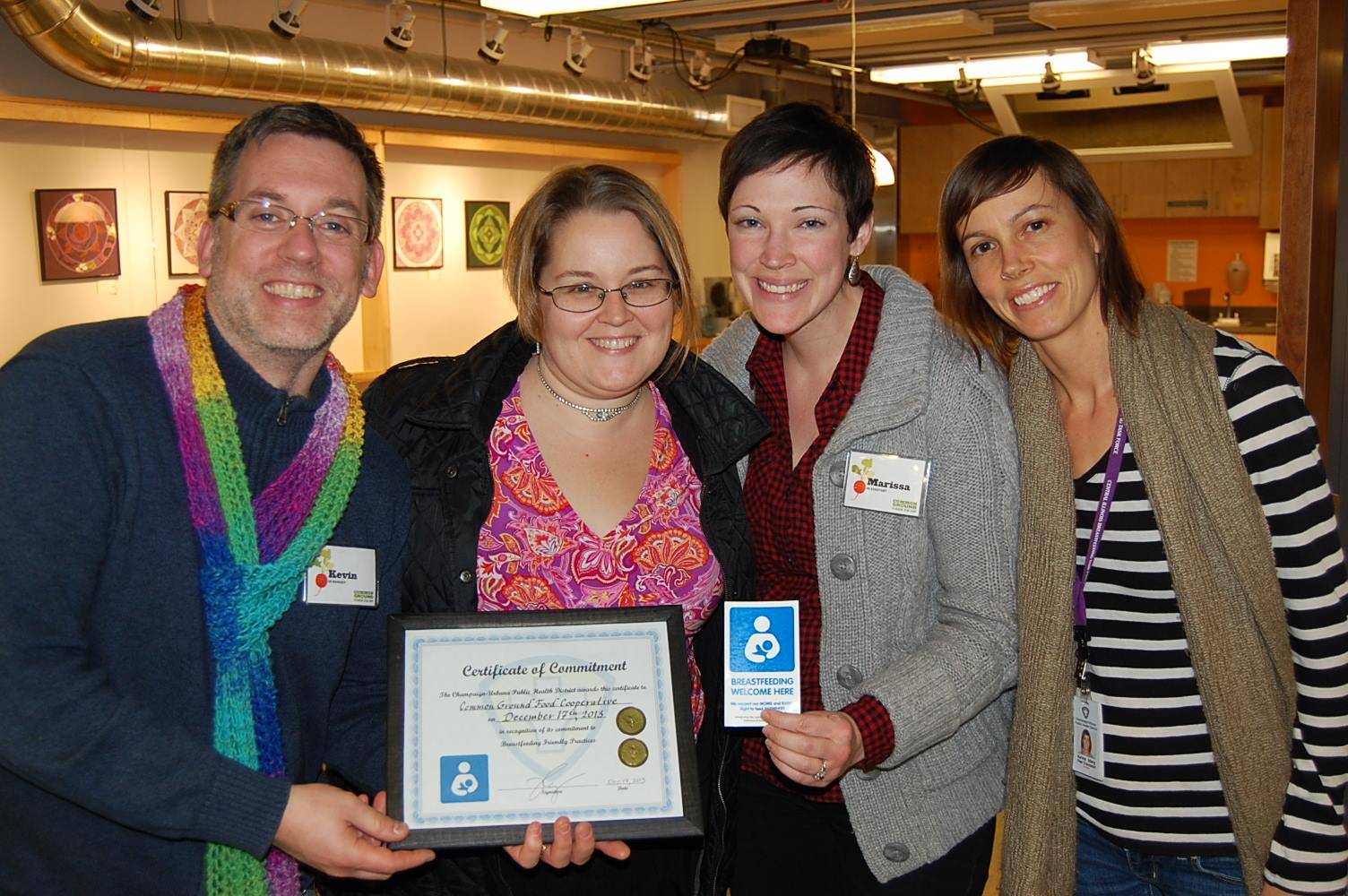The Champaign-Urbana Public Health District is a vital resource for our community, offering many resources and programs of support for maternal and child health. These services include a family case management program to connect families to housing and healthcare resources, a home visiting program supporting child development, a summer foods program addressing food insecurity during the summer months, a PlayRX program tackling childhood obesity, and breastfeeding support services including a milk depot, to name a few.
One such program that CUPHD Nutritionist Rachel Jones and WIC Breastfeeding Coordinator Valerie Koress, RDN, LDN, IBCLC are in the process of revamping is the Breastfeeding-Friendly Business Certification Program. The goal of the program is to educate employees, management, and business owners in the area about state and federal breastfeeding laws, to encourage breastfeeding-friendly practices such as providing a private and comfortable space for lactating employees to pump, and to ensure customers feel welcome to breastfeed while at their establishment.
The program began in 2012, sparked from a call to action by a local, concerned mom. At an early childhood health conference, she brought to light the lack of support for breastfeeding, working moms in the community. CUPHD took action. While there are many breastfeeding support groups and advocates in the community such as the Carle Breastfeeding Support Group, Nurtured Beginnings private practice, or lactation counselor services at CUPHD for WIC clients, this mom felt that local businesses weren’t doing enough to ensure that moms felt comfortable to breastfeed or pump, both as employees and customers. Since the program’s beginning, there are currently 16 businesses certified as breastfeeding-friendly. However, Jones and Koress want that number to increase. Koress said: “I truly believe that more women would breastfeed successfully and exclusively if we had better postpartum support systems, including support from employers where moms are working (as well as from hospitals, healthcare providers, etc.). That being said, employers need to recognize the importance of supporting breastfeeding moms to stay competitive and be able to recruit the best employees.”
The certification process is simple, fast, and free. Certification requires a 45 minute to 1 hour session that takes place at the business. Jones will educate on laws that businesses are required to abide by and work with the business to ensure a private, sanitary and comfortable space for working moms to breastfeed. Not only is this practice important for employers in terms of employee retention, morale, and reduced healthcare costs; it’s now mandated by Illinois state law to allow paid time for lactating mothers to pump or breastfeed while at work. Upon completion of the training, businesses receive a certificate and a window decal to hang in their storefronts, letting customers know they are certified as such. Furthermore, CUPHD keeps a list of breastfeeding-friendly businesses on their website. To maintain certification, businesses just need to have a phone call with Jones every other year and host the in-person training every other year.
The U.S. 2018 Breastfeeding Report Card provided by the CDC shows that U.S. moms initiate breastfeeding at a rate of 83.2%, but by 3 months postpartum only 46.9% are breastfeeding exclusively, and by 6 months, only 24.9% are breastfeeding exclusively. While there are multiple factors that impact this, returning to work typically occurs between 6-12 weeks postpartum, so it’s known that it is a significant factor in reducing exclusive breastfeeding in the first 3-4 months. The 2018 Employee Benefits Survey administered by the Society for Human Resource Management found that nearly half (49%) of employers surveyed are offering lactation rooms as an employee benefit, and 11% are going so far as to offer lactation support services (such as consulting and education). Koress and Jones believe that if more employers offered support services, these breastfeeding prevalence statistics can increase. Evidence-based research has long since supported the fact that both mom and baby will be healthier in the long-term on the cellular level if breastfeeding can be realized. Koress and Jones hope that our community health can be improved with this program.
Koress and Jones are champions of maternal and infant health in our community. Their message to new moms is to get help and support with breastfeeding as soon as possible. The first hour to 24 hours after birth is the most important time to get off to a healthy start for both mom and baby.
Interested businesses can contact Jones to set up a training session by emailing her at rjones@c-uphd.org or by calling at 217-531-4364.
Common Ground Co-op (shown in photo from Facebook) was certified as breastfeeding-friendly in 2014.








